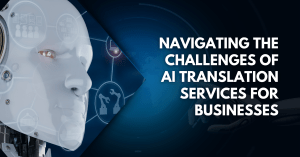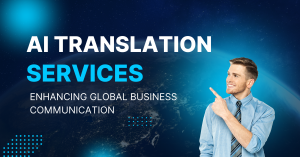Imagine a world where machines not only assist but think, learn, and make decisions—just like humans. This isn’t science fiction; it’s the reality of Artificial Intelligence (AI) today. From self-driving cars navigating busy city streets to AI-powered chatbots providing instant customer support, AI is becoming an integral part of our everyday lives.
In fact, according to a recent report by PwC, AI is set to add $15.7 trillion to the global economy by 2030, marking a dramatic shift in how businesses across industries operate. At the core of this revolution is artificial intelligence software development—a game-changing field that is enabling companies to create smarter, more efficient, and highly innovative solutions.
We dive into the ways artificial intelligence software development services are reshaping industries, unlocking new possibilities, and creating a future that’s powered by intelligent software.
The Rise of AI Software Development
AI has evolved rapidly from simple rule-based systems to complex neural networks capable of mimicking human intelligence. This evolution is fueled by advancements in machine learning (ML), deep learning, and natural language processing (NLP)—technologies that empower software to learn, adapt, and make decisions with minimal human intervention.
Today, businesses leverage artificial intelligence software development to build applications that can analyze vast datasets, predict trends, and automate repetitive tasks. With the help of artificial intelligence software development companies, organizations are achieving faster innovation cycles and gaining a competitive edge in the digital age.
Key Technologies Driving AI Transformation
The rapid growth of AI applications is powered by the following technologies:
Machine Learning & Deep Learning:
- Enable systems to learn patterns from data and make predictions without explicit programming.
- Widely used in fraud detection, predictive analytics, and recommendation systems.
Natural Language Processing (NLP):
- Powers chatbots, virtual assistants, and sentiment analysis tools.
- Helps businesses improve customer interactions and streamline communication.
Computer Vision:
- Allows machines to interpret and analyze visual data.
- Crucial for applications like facial recognition, autonomous vehicles, and quality control.
Robotic Process Automation (RPA):
- Automates repetitive, rule-based tasks, freeing up human resources for more strategic activities.
- With these technologies, artificial intelligence software development services are enabling businesses to develop smart systems tailored to their unique needs.
Industry-Specific Applications of AI Software

AI software development is driving transformation across multiple industries. Here’s a closer look at its impact:
Healthcare
- AI-powered systems assist in diagnosing diseases, analyzing medical images, and predicting patient outcomes.
- Virtual health assistants provide 24/7 support for patient queries and medication reminders.
- Drug discovery algorithms accelerate research and reduce costs.
Finance
- AI software helps in fraud detection by identifying unusual transaction patterns.
- Algorithmic trading platforms optimize investment decisions with real-time insights.
- Personalized customer service chatbots improve user experience and reduce wait times.
Retail & E-commerce
- AI recommendation engines personalize shopping experiences by suggesting products based on user behavior.
- Inventory management systems predict demand and reduce wastage.
- Visual search tools allow customers to find products using images rather than text.
Manufacturing
- AI-driven predictive maintenance systems detect equipment issues before they cause downtime.
- Robotics and automation streamline assembly lines and improve quality control.
- Supply chain optimization tools enhance logistics and inventory management.
Transportation & Logistics
- Autonomous vehicles powered by AI are transforming logistics and delivery services.
- AI routing algorithms optimize routes, reducing fuel consumption and delivery times.
- Fleet management systems monitor vehicle performance and improve efficiency.
Marketing & Advertising
- AI tools enable customer segmentation and personalized content marketing.
- AI analytics platforms evaluate campaign performance and optimize ad targeting.
- Chatbots and virtual assistants enhance customer engagement.
These examples highlight the vast potential of artificial intelligence software development services to enhance processes, reduce costs, and drive growth.
Benefits of AI in Software Development
AI offers numerous advantages for businesses, including:
- Increased Efficiency – Automates repetitive tasks, allowing teams to focus on strategic goals.
- Enhanced Decision-Making – Provides data-driven insights to improve accuracy and performance.
- Cost Reduction – Reduces operational expenses through automation and optimization.
- Scalability – Enables businesses to handle large datasets and workloads seamlessly.
- Innovation and Personalization – Drives the creation of new products and highly customized services.
By investing in artificial intelligence software development, companies can future-proof their operations and unlock new opportunities for growth.
Challenges in AI Implementation
Despite its potential, AI adoption comes with challenges:
Data Privacy and Security Concerns
- AI systems require vast amounts of data to train and function effectively. However, this raises concerns about the privacy and security of sensitive information.
- Organizations need to ensure that the data used to train AI models is protected from breaches, misuse, or unauthorized access. This is particularly crucial when dealing with personal or financial data.
- Compliance with regulations such as GDPR and other data protection laws can be challenging for businesses integrating AI, especially when handling cross-border data.
Bias in AI Algorithms
- One of the significant challenges in AI is ensuring that the algorithms are fair and unbiased. AI systems learn from data, and if the data used for training is biased, the AI model will reflect those biases.
- This can lead to discriminatory outcomes, such as racial, gender, or age biases in hiring processes, loan approvals, or criminal justice decisions.
- Addressing bias requires diligent efforts in data collection, algorithm design, and constant monitoring of AI outputs to ensure fairness and inclusivity.
Lack of Skilled Talent
- AI is a highly specialized field that requires expertise in various domains such as machine learning (ML), data science, programming, and ethics.
- There is currently a global shortage of AI talent, making it difficult for companies to find skilled professionals capable of developing and implementing AI solutions.
- Training and upskilling current employees can also be a lengthy and expensive process, further complicating AI adoption for smaller businesses without substantial resources.
High Implementation Costs
- Developing and deploying AI solutions can be expensive, especially for businesses that are new to the technology. Costs include data collection, infrastructure setup, computational resources, and hiring skilled professionals.
- AI systems also require ongoing maintenance, updates, and fine-tuning to ensure they remain accurate and effective. This continuous investment can be a financial burden for some companies.
- For smaller organizations or startups, the initial investment in AI technology can deter adoption despite the long-term benefits.
- Partnering with an experienced artificial intelligence software development company can help businesses overcome these hurdles and maximize AI’s benefits.
Future Trends in AI Software Development

The future of AI is brimming with exciting possibilities:
AI and IoT Integration: Smart ecosystems where AI-enabled devices communicate and collaborate.
Explainable AI (XAI): Transparent AI systems that explain decisions, improving trust and compliance.
Edge AI: Real-time AI processing at the edge of networks for faster performance.
AI for Sustainability: Applications that address environmental challenges, such as energy management and waste reduction.
- As these trends evolve, artificial intelligence software development services will play a pivotal role in creating scalable and sustainable solutions.
Artificial intelligence is no longer a tool of the future—it’s a transformative force that’s already reshaping industries. From improving healthcare outcomes and automating financial services to enhancing customer experiences and optimizing manufacturing, artificial intelligence software development is driving innovation across the board.
For businesses looking to stay ahead in this AI-driven era, investing in artificial intelligence software development services is not just an option but a necessity. Whether you’re looking to streamline operations, personalize customer interactions, or gain data-driven insights, partnering with a reliable artificial intelligence software development company can help you achieve your goals.
Ready to embrace AI and transform your business? Contact Vedhas Technology today and explore how our AI solutions can empower your growth!





